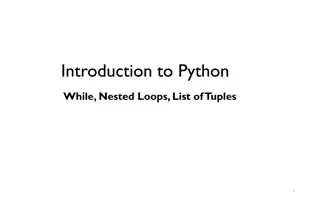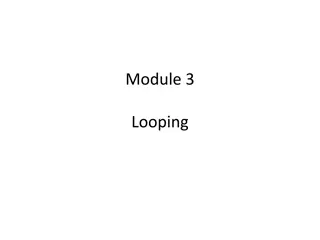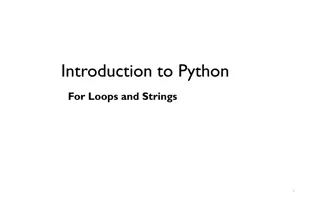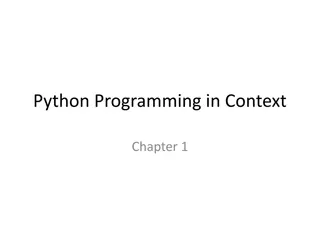Understanding While Loops and Sentinel Loops in Python
Learn about different categories of loops in Python, including definite and indefinite loops, with a focus on while loops and sentinel loops. Dive into examples and solutions to grasp the concept effectively.
Download Presentation

Please find below an Image/Link to download the presentation.
The content on the website is provided AS IS for your information and personal use only. It may not be sold, licensed, or shared on other websites without obtaining consent from the author. Download presentation by click this link. If you encounter any issues during the download, it is possible that the publisher has removed the file from their server.
E N D
Presentation Transcript
CSc 110, Autumn 2017 Lecture 17: while Loops and Sentinel Loops Adapted from slides by Marty Stepp and Stuart Reges
Categories of loops definite loop: Executes a known number of times. The for loops we have seen are definite loops. Print "hello" 10 times. Find all the prime numbers up to an integer n. Print each odd number between 5 and 127. indefinite loop: One where the number of times its body repeats is not known in advance. Prompt the user until they type a non-negative number. Print random numbers until a prime number is printed. Repeat until the user has typed "q" to quit.
The while loop while loop: Repeatedly executes its body as long as a logical test is true. while test: statement(s) Example: num = 1 # initialization while num <= 200: print(str(num) + " ", end='') num = num * 2 # test # update # output: 1 2 4 8 16 32 64 128
Example while loop # finds the first factor of 91, other than 1 n = 91 factor = 2 while n % factor != 0: factor += 1 print("First factor is", factor) # output: First factor is 7 while is better than for because we don't know how many times we will need to increment to find the factor.
Sentinel values sentinel: A value that signals the end of user input. sentinel loop: Repeats until a sentinel value is seen. Example: Write a program that prompts the user for text until the user types "quit", then output the total number of characters typed. (In this case, "quit" is the sentinel value.) Type a word (or "quit" to exit): hello Type a word (or "quit" to exit): yay Type a word (or "quit" to exit): quit You typed a total of 8 characters.
Solution? sum = 0 response = "dummy" # "dummy" value, anything but "quit" while response != "quit": response = input("Type a word (or \"quit\" to exit): ") sum += len(response) print("You typed a total of " + str(sum) + " characters.") This solution produces the wrong output. Why? You typed a total of 12 characters.
The problem with our code Our code uses a pattern like this: sum = 0 while input is not the sentinel: prompt for input; read input. add input length to the sum. On the last pass, the sentinel s length (4) is added to the sum: prompt for input; read input ("quit"). add input length (4) to the sum. This is a fencepost problem. Must read N lines, but only sum the lengths of the first N-1.
A fencepost solution sum = 0. prompt for input; read input. # place a "post" while (input is not the sentinel): add input length to the sum. prompt for input; read input. # place a "wire" # place a "post" Sentinel loops often utilize a fencepost "loop-and-a-half" style solution by pulling some code out of the loop.
Correct code sum = 0 # pull one prompt/read ("post") out of the loop response = input("Type a word (or \"quit\" to exit): ") while (response != "quit"): sum += len(response) # moved to top of loop response = input("Type a word (or \"quit\" to exit): ") print("You typed a total of " + str(sum) + " characters.")
Sentinel as a constant SENTINEL = "quit" ... sum = 0 # pull one prompt/read ("post") out of the loop response = input("Type a word (or \"" + SENTINEL + "\" to exit): ") while response != SENTINEL: sum += len(response) # moved to top of loop response = input("Type a word (or \"" + SENTINEL + "\" to exit): ") print("You typed a total of " + str(sum) + " characters.")























